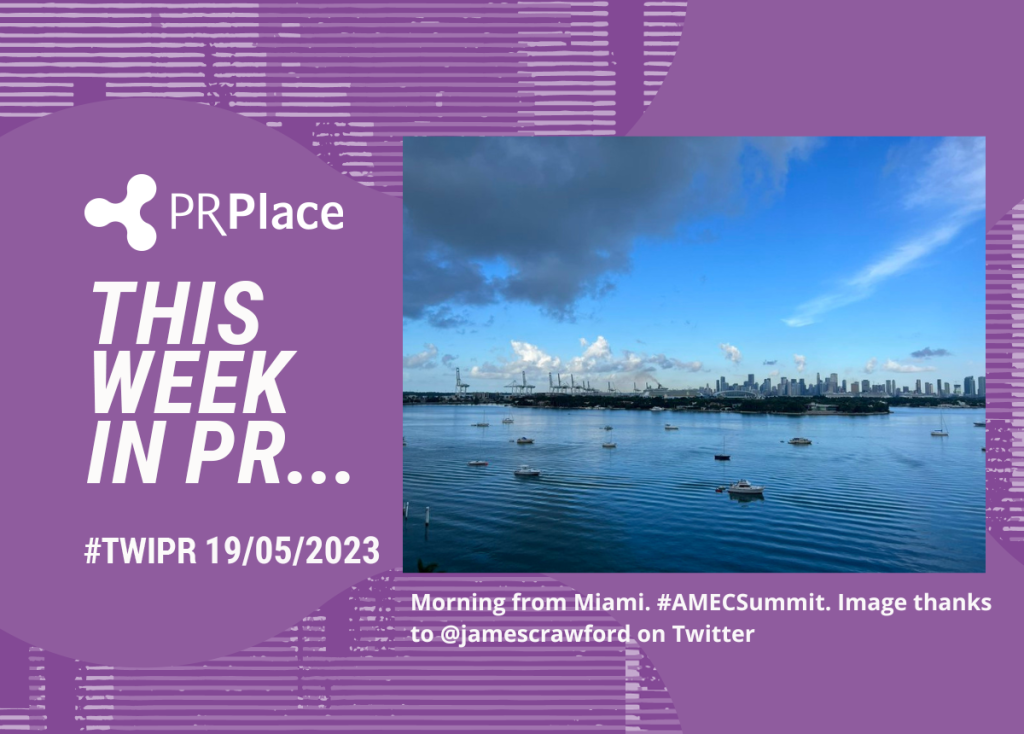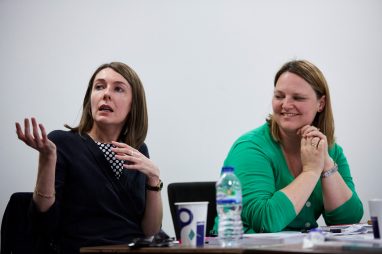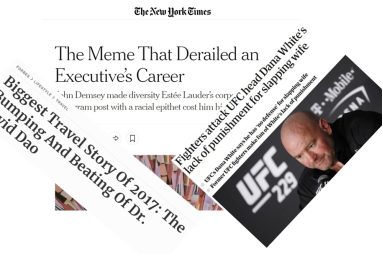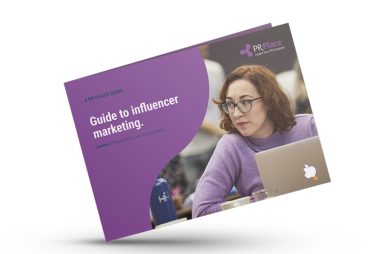This week in PR (19 May)

About the author
Richard Bailey Hon FCIPR is editor of PR Academy's PR Place Insights. He teaches and assesses undergraduate, postgraduate and professional students.

It happened this week
- Cancel pharma: Following a review, the University of Oxford has decided to remove the Sackler name from its buildings and professorships, though it will keep all the donations it has received. The Sackler family’s wealth comes from Purdue Pharma which developed and marketed OxyContin, a painkiller associated with the opioid crisis in the US.
Purpose, climate and ESG
Consulting, skills and careers
- Calm Edged Rebels: How to get stuff done! [podcast] (19 May)
‘Daniel Goleman tells us that an ability to focus is a better predictor of success than IQ.’ - Ben Smith with Andrew Bloch: PR pitches and mergers & acquisitions May 2023 update [podcast] (18 May)
‘PHA have just won the National Gallery – the merchandise range; it was previously handled in house.’
Gender, diversity, health and wellbeing
Add to your learning this Global Accessibility Awareness Day by downloading our latest EDI guide on Inclusive Language from the @CIPRdiversity Network.
Find out more and download the report:https://t.co/7u5g2ZjfTu#GAAD2023 #GAAD @gbla11yday pic.twitter.com/HAuGhHk9Mt
— Chartered Institute of Public Relations (@CIPR_Global) May 18, 2023
- Dan Gold with Patrick Melville: Striking a Balance: Prioritising Everyday Listening and Sharing [podcast] (17 May)
‘I was diagnosed with terminal cancer. I had to find ways to share this trauma. I realised being honest was the best way.’ - David Robson: Unmasking Coeliac Man (16 May)
‘Coeliac disease is a serious illness where the body’s immune system attacks its own tissues when you eat gluten. This causes damage to the lining of the gut and means the body can’t properly absorb nutrients from food.’
Public and third sectors
- Camilla Mankabady: Eurovision in Liverpool: United by music and United by praise (15 May)
‘For six months, Communications colleagues from across Liverpool City Council and the city have been planning for Eurovision. We have met, we have discussed, we have written, we have navigated and we have planned.’
Politics, public affairs and public sphere
- Emily Chen: Can Labour really fix the housing crisis? (18 May)
‘This Labour policy announcement comes against the backdrop of Conservative in-fighting over house building and targets, with red wall MPs wanting targets to help drive forward construction, while MPs in traditional Conservative heartlands fear local backlash to planning applications.’ - Hugh Matthews: Trade Tuesday – Caught between a rock and a hard place: The long shadow of Brexit on trade (16 May)
‘Away from the rhetoric of the Brexit debate, for Badenoch, this can be considered not a surrendering of her Brexit credentials, but more of an opportunity for her to showcase a pragmatic, business-friendly approach to politics.’ - Will Neale: Government turns on charm for Clarkson’s Farm stars (16 May)
‘As part of the summit, the government has announced that 45,000 short term visas will be granted to work in the UK for food picking. However, industry has quickly responded claiming its it needs nearly double that number to meet current demand.’
Research, data, measurement and evaluation
The #PR industry and its data, measurement and evaluation professionals are so lucky to have distinguished professor @jimmacnamara share his expertise and drive and support best practice around the globe. A great talk to the #amecsummit on avoiding false logic fallacies,… pic.twitter.com/P1kJSTR5nw
— Richard Bagnall (@richardbagnall) May 16, 2023
- Stuart Bruce: Reflections on the AMEC Global Summit 2023… before it starts (16 May)
‘If you’ve ever heard me speak at a conference or attended one of my PR and communications training courses then you’ll have heard me drone on… sorry, I mean speak passionately… about insight. I’m constantly frustrated by the desire of so many PR people to measure what they’ve done. Why? You’re missing two of the most important steps. The first is measure, or data and analytics, for insight to help you make better decisions. The other problem I see is even if companies are gathering data and ‘insights’ they aren’t necessarily turning it into actionable data. Why don’t we see more companies using measurement research for policy development and message testing?’
Crisis, risk and reputation
- Grayling: Navigating crisis communications in Germany: An interview with Nicole Heyder, Managing Director, Advice Partners (no date)
‘Internal communications have become increasingly important recently. This is very good, because it is the only way that employees can become positive ambassadors for the company in a crisis.’ - Amanda Coleman: Where is your next crisis going to come from? (14 May)
‘It is clear that the next reputational crisis businesses and organisations may face is their culture. Do we know what the culture of the organisation we are working or supporting is? And are we seeing the reality?’
Behaviour and influence
Internal communication
- Jenni Field: Why employee engagement surveys are measuring the wrong thing (18 May)
‘When people tell me their engagement scores, I ask what they mean because I still genuinely can’t grasp what a 65% engagement score means in practice.’ - Katie Macaulay with Charlotte Carroll: Unilever: Inside a global success story [podcast] (no date)
‘I was fortunate to work with Keith Weed early in my career. He’s very visionary about communications: he understood the role of employee communication and employee engagement.’
Media, digital and technology
- Anthony Hughes: People have morals; machines have objectives – the AI hazard (18 May)
‘From a reputational perspective perhaps the most alarming of them all is the law of unforeseen consequences – the yawning gap between our ability to innovate and our ability to foresee the consequences.’ - Dan Slee: Holly and Phil show the changing face of the local newspapers on Facebook (17 May)
‘Newspapers are no longer newspapers. They think of themselves as news brands. They are titles whose masthead bleed from print to social media, email, the web and even radio.’ - Emma Drake: How to start a podcast – a 10 point checklist [podcast] (18 May)
‘Podcasts have emerged as a powerful tool to engage your audience. Here’s how to create a successful podcast that resonates with your target public.’ - Stephen Waddington: AI adoption in public relations limited, so far (18 May)
‘According to the USC Annenberg and WE Communications report, AI innovation in public relations is driven by individuals rather than a structured organisational approach. Less than a quarter of respondents said their organisation is changing workflow due to new AI tools.’ - Drew Benvie: How to get started on Bluesky (16 May)
‘The brainchild of Twitter’s former CEO and co-founder, Jack Dorsey, Bluesky was originally a side project kicked off by Dorsey in 2019 while he was still at Twitter, which then became fully divorced from it once Elon Musk took over in 2022.’


